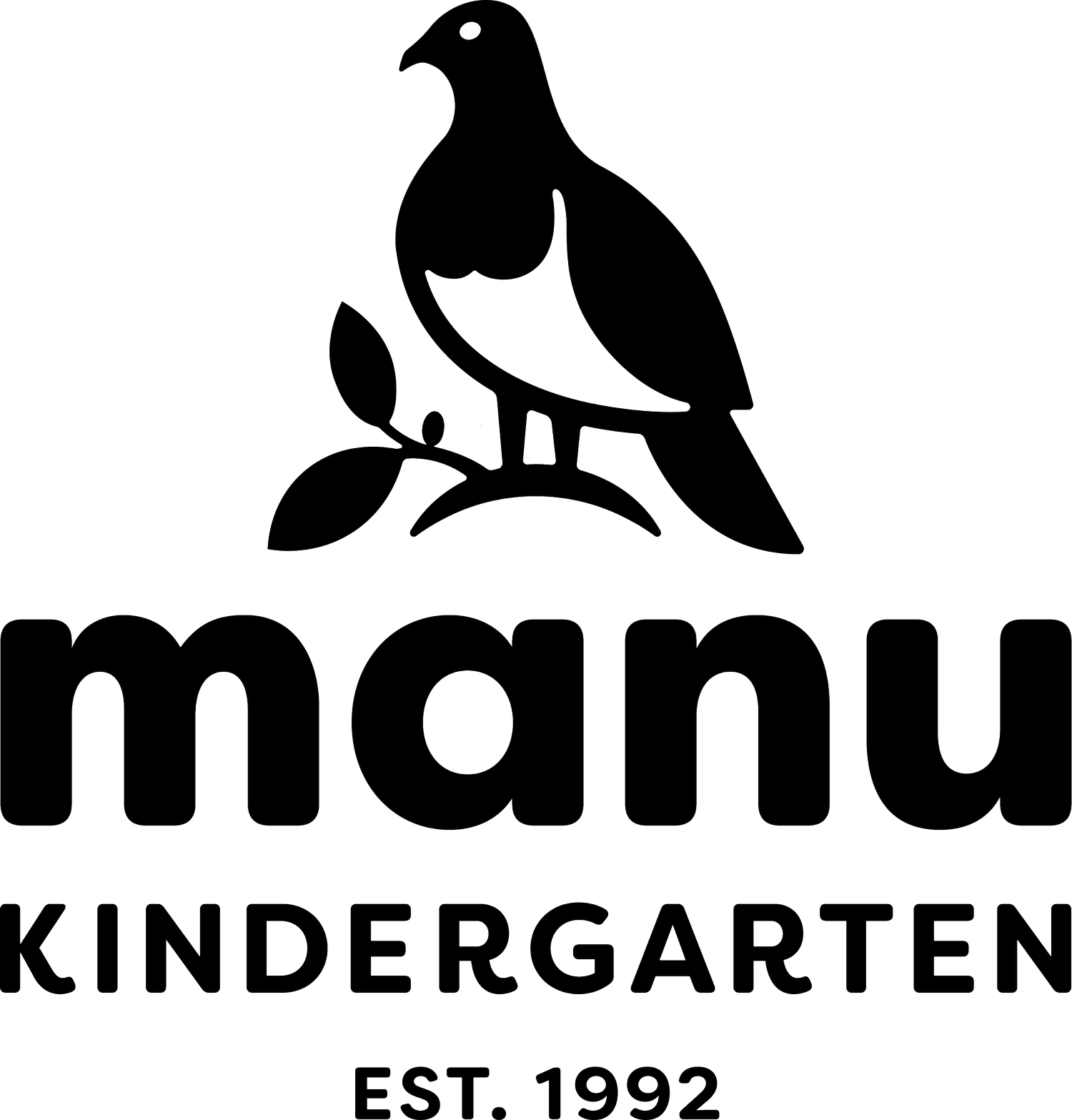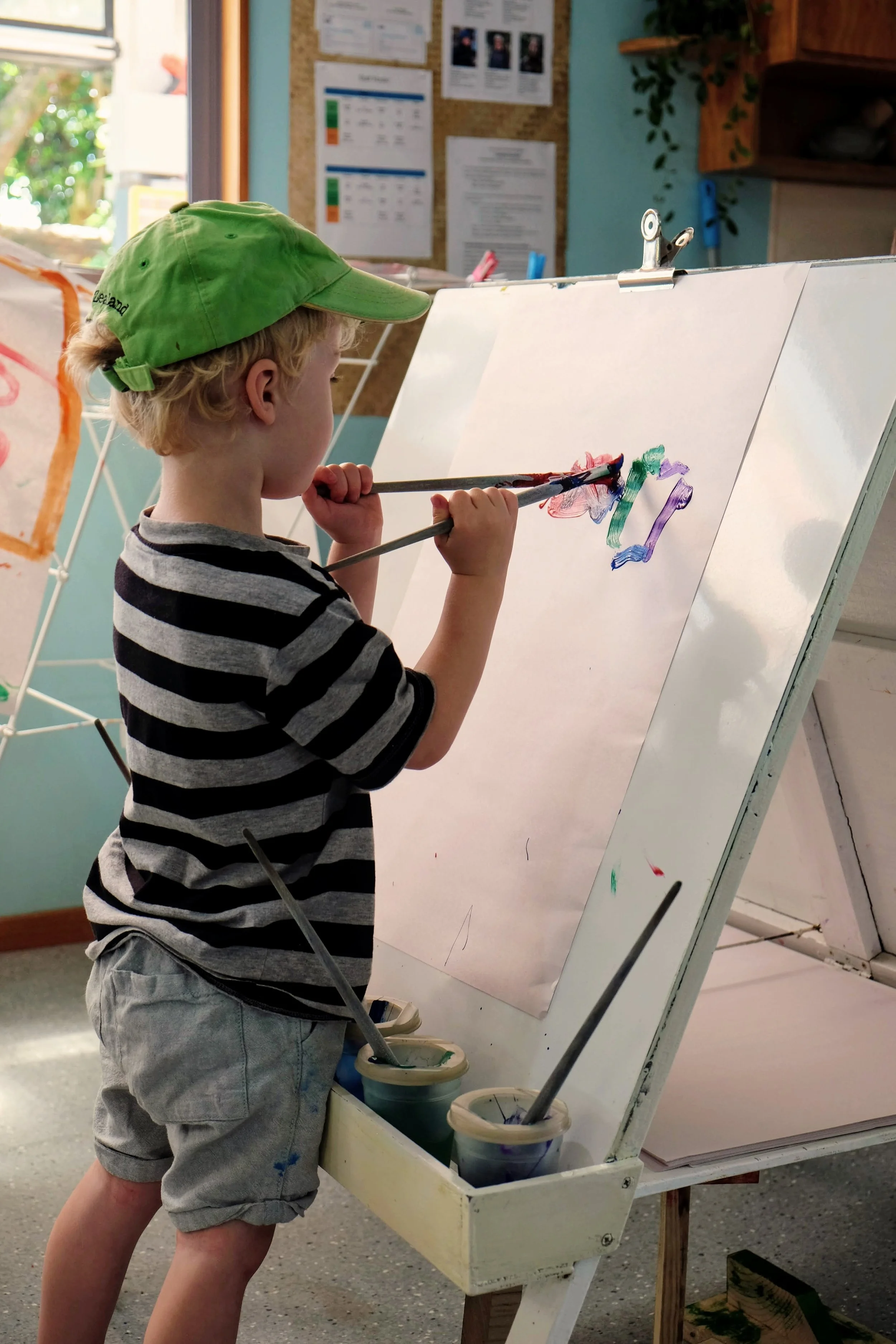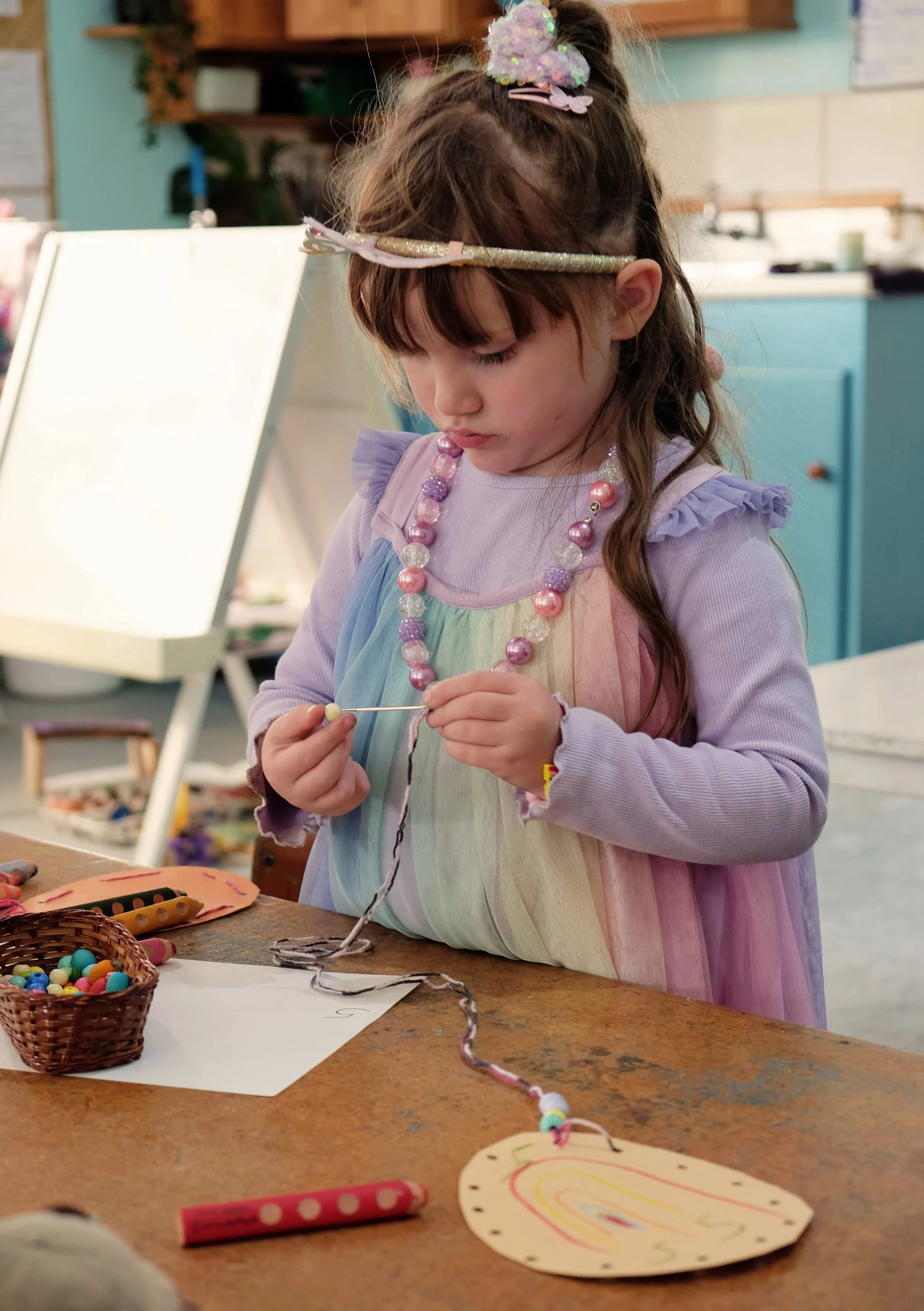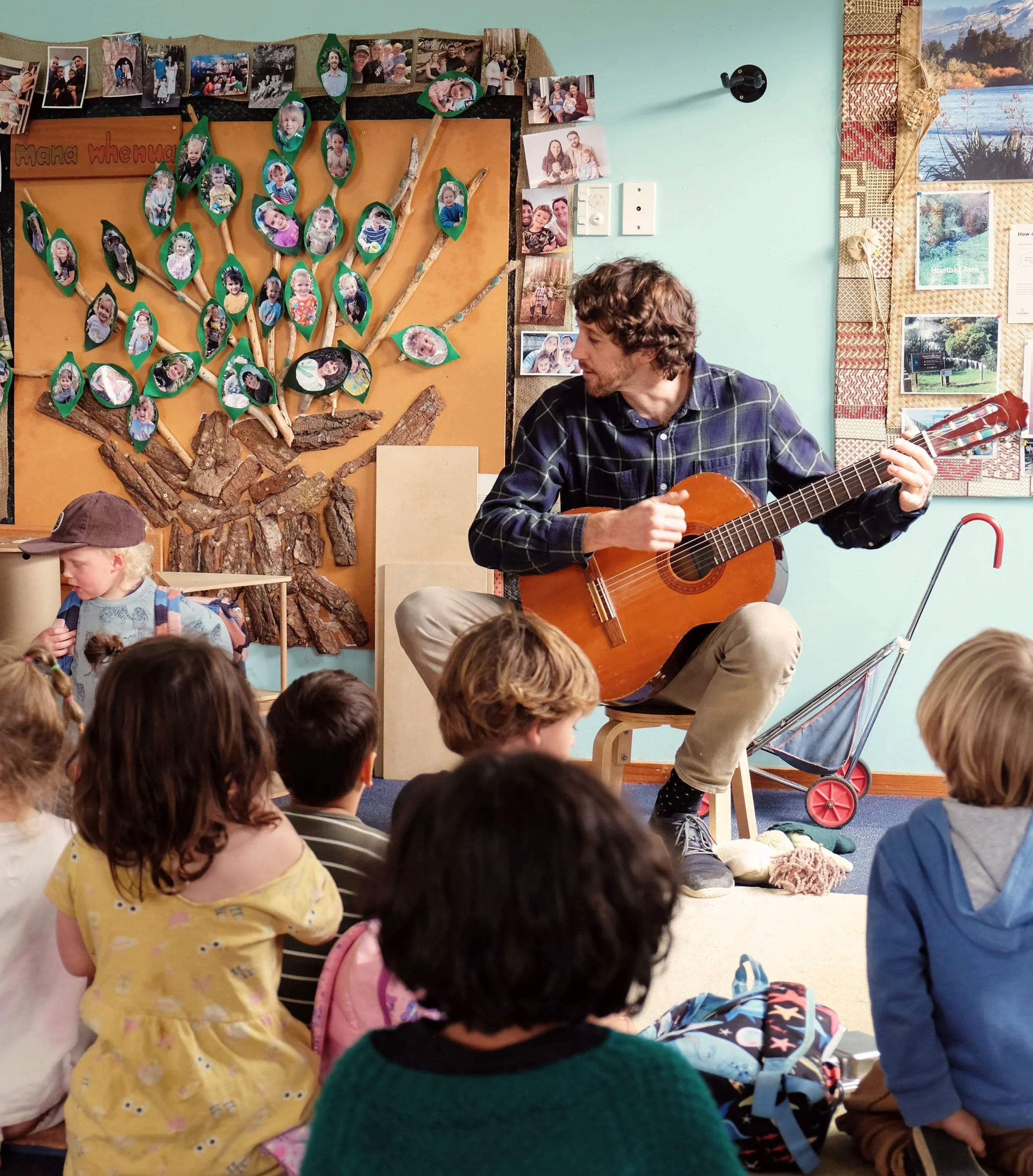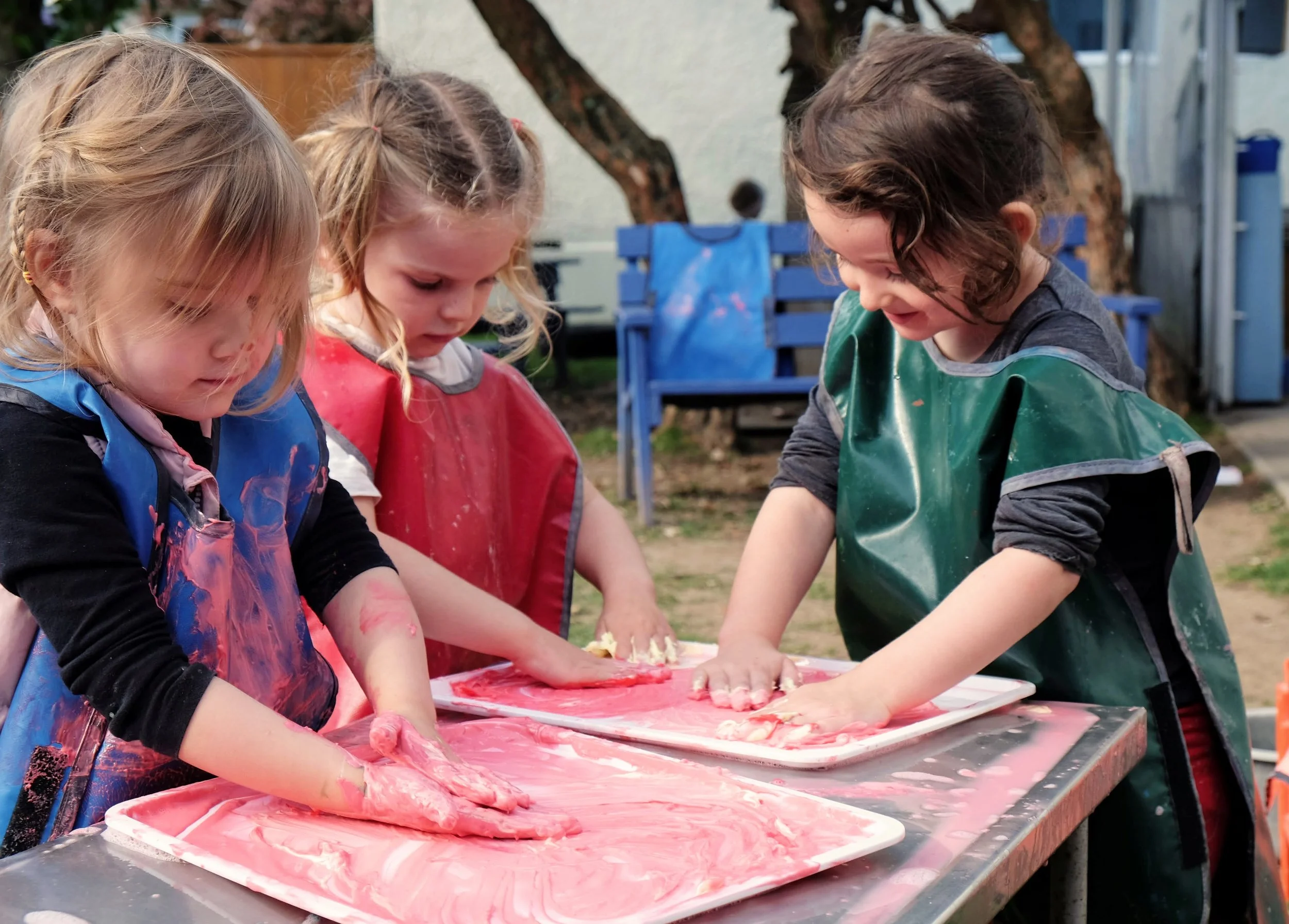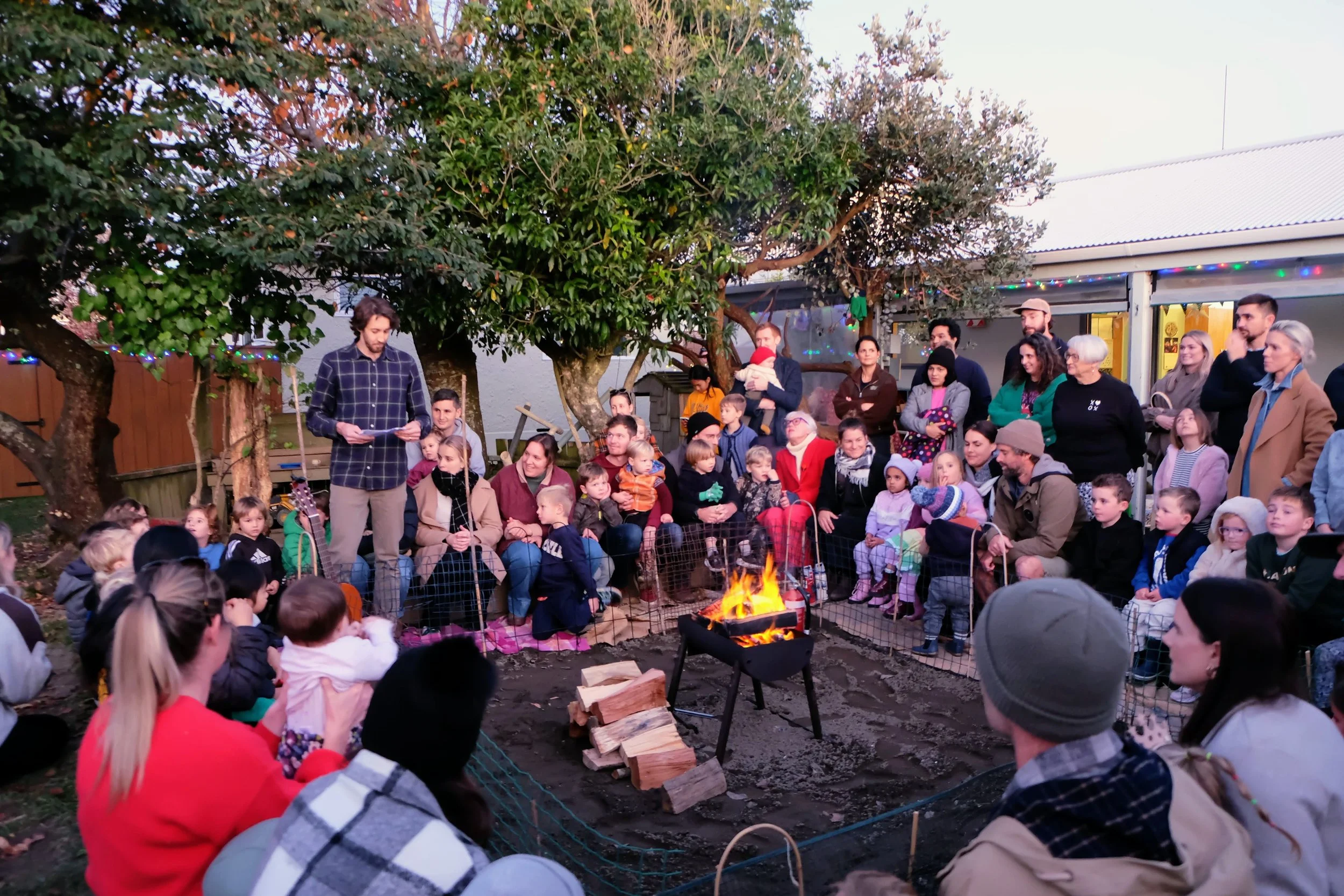
Our Programme
At Manu Kindergarten, teaching and learning is guided by Te Whāriki, the New Zealand Early Childhood Curriculum. We offer a play-based programme that nurtures each child’s social, emotional, physical, and cognitive development. Our experienced kaiako (teachers) foster a warm and inclusive environment, modelling core values such as respect, kindness, and empathy.
Tamariki have the freedom to choose their own activities throughout much of the day. We also gather as a group several times daily for meals, music, storytime, and other activities that foster a sense of belonging.
Our teaching and learning is guided by Te Whāriki, Aotearoa New Zealand’s early childhood curriculum. Te Whāriki is based on four key principles: empowerment (whakamana), holistic development (kotahitanga), family and community (whānau tangata), and relationships (ngā hononga). It supports children to grow as competent learners across five strands: wellbeing, belonging, contribution, communication, and exploration. This framework guides our everyday practice as we support each child’s identity, culture, and learning in meaningful ways.
Curriculum
Social and emotional learning
Some of the most important skills your child will learn at kindergarten are how to cooperate, empathise, form friendships, and navigate conflict in peaceful ways. Equally important is learning to recognise, name, and understand their own emotions and those of others.
Our kaiako support this emotional learning through calm, consistent guidance, helping children to identify feelings, express them in appropriate ways, and develop strategies to manage big emotions. These skills are gently scaffolded through everyday interactions, play, and group experiences.
Our small group size allows tamariki to form trusting relationships with teachers and peers, creating a safe and supportive environment for social learning. These early social and emotional foundations help to shape lifelong outcomes in wellbeing, resilience, and the ability to build healthy, fulfilling relationships.
Communication and literacy
Supporting oral language development is central to everything we do at Kindergarten. Our small group size and regular staff creates the context of connection essential for growing confident communicators. Meaningful conversation, song, story, puppet shows, poems, and playful exploration of rhythm, rhyme, and new vocabulary all help with language development. Every second Thursday, we enjoy a visit from the library bus where tamariki can choose books to borrow and share at kindergarten.
Phonological awareness (the ability to hear and manipulate the sounds in spoken language) is the essential foundation of literacy development. We help children to develop their phonological awareness through having fun with words, identifying and creating rhymes, clapping out syllables, and playing with alliteration. These playful experiences not only build important foundations for reading and writing but create a fun and positive attitude towards language. As they grow in confidence, older children are supported to recognise and begin writing their own names in preparation for school.
Te reo Māori is a valued and living part of our daily programme — heard in greetings, waiata, karakia, and everyday conversations. Kaiako model and gently extend te reo in context, helping tamariki develop both confidence and understanding. Stories, poems, and songs from a variety of cultures are also shared, supporting a wider appreciation of language and identity.
Forest Programme
At Manu Kindergarten, a special part of our programme involves taking tamariki into nearby ngahere (forest). We are fortunate to be located within walking distance of many of these beautiful areas connected to the Huatoki Domain. Here, with the help of parent helpers, tamariki are free to explore te taiao (the natural world), connecting with the rhythms of nature. These experiences nurture a deep sense of place and belonging, while also building confidence in the outdoors.
Our head teacher, Scott, brings a strong interest in ecology to this work. He supports tamariki to learn the names of native trees and plants, as well as the insects, birds, and other creatures that live in the forest. Tamariki are also taught about problem plants, such as invasive weeds, and how these can affect forest health — helping them understand the balance of the natural world. Often, our forest visits include collecting native seeds to sow, helping us grow our own native plants back at kindergarten. We foster kaitiakitanga — guardianship and care for the environment — by involving tamariki in these small but meaningful actions, which help them develop an ethic of care and growing respect for the world around them.
We also build a relationship with the local awa, the Huatoki, helping tamariki see it as part of the living landscape they belong to. By spending time with the river and observing its changes, they deepen their connection to place and begin to understand their role in caring for it.
Traditionally, our forest programme took place in a part of the Huatoki Domain further from kindergarten. While it offered a beautiful setting, it required tamariki to be dropped off by whānau, which became challenging if the weather changed unexpectedly and we needed to return to kindergarten. We are now in the process of strengthening relationships with local landowners and focusing on forest areas within walking distance of the kindergarten. This allows us to bring the forest into our weekly rhythm more often, through shorter, more manageable excursions that remain deeply connected to our values of place, care, and learning in nature.
Our learning environment
At Manu Kindergarten, we take great care in creating an environment that feels welcoming and beautiful. Indoors, the space is cosy and homely, with soft lighting, natural textures, indoor plants, and large windows that offer views of the outdoor greenery.
Many of our resources are handcrafted from natural materials and have been treasured in the kindergarten for years. They are chosen not only for their beauty and tactile appeal, but also for their durability. Quality wooden furniture, along with hand-made and recycled materials used throughout the space, contributes to the overall sense of warmth and homeliness. The open-plan layout allows for clear supervision, while still offering protected spaces that support uninterrupted, focused play.
Outdoors, the environment has a relaxed, backyard feel, with grassy areas, fruit trees, flowers, and a vegetable garden. We have a large sandpit with a sand kitchen that provides tamariki with endless opportunities for imaginative play. Other features include swings, a play platform, climbing apparatus, a playhouse, and a variety of loose parts for open-ended construction.
Art and creativity
We encourage creative expression through a range of open-ended art experiences. Engaging prompts are provided daily, along with a variety of materials such as paint, clay, coloured pencils, pastels, charcoal, beads, fabric and more.
Open-ended art activities allow children to create freely and communicate their ideas without a predetermined outcome—avoiding stencils or colouring-in, which take the creative process away from the child. Exploring art materials in this way gives tamariki freedom of expression, recognising that the creative process is as important as—if not more important than—the finished product. This approach allows children to use their imagination and innate creativity to produce authentic artworks.
Music and movement
Music is an important part of our daily rhythm at kindergarten. Moving to music — through creative dance, body percussion or playing instruments — helps build physical coordination, body awareness, and rhythm. Group music times also support listening skills, turn-taking, and a sense of belonging.
Music plays a large role in emotional development — it helps tamariki to recognise and express feelings, and can support emotional regulation by calming or energising the body and mind. Regular exposure to music in the early years supports brain development, particularly in areas linked to language, memory, and pattern recognition.
We explore a wide range of musical styles, from traditional waiata to contemporary songs, and encourage all children to participate in ways that feel comfortable for them. Soft music is often playing as children arrive and during quieter parts of the day, creating a calm and welcoming atmosphere.
Science, maths and technology
We foster early scientific thinking by encouraging active, hands-on discovery, building on children’s natural curiosity about how things work. Tamariki are given the opportunity to take part in daily baking at our popular baking bench, where they learn about measuring, mixing, kneading, and then baking their own bun. Through water and sand play, construction, and other experiments, our tamariki become familiar with raw materials and the principles of cause and effect. Another popular area is our fully equipped woodworking bench, offering many possibilities for creative construction.
The foundation of mathematical understanding begins with number sense - that is a child’s ability to understand, relate to, and work with numbers in flexible ways. Number sense is grounded in real world experiences through active exploration. Our kindergarten provides a stimulating environment where children develop the skills of spatial reasoning, pattern creation, comparison, measurement, sorting, and one-to-one correspondence using a diverse array of mathematical games, toys, and puzzles. Our kaiako use rich conversations to extend children's thinking and build their conceptual understanding.
Mana whenua - belonging
At Manu Kindergarten, we deeply value the involvement of whānau and our wider community. Parents and caregivers are always welcome to spend time with us during the session — whether it’s to stay with their child who is transitioning, read stories, or offer a special skill or interest. We see kindergarten as a shared space and recognise the importance of whanau contribution.
Our programme includes special events such as our Matariki whānau celebration. We also take part in local excursions that help tamariki build connections with the people, places, and stories in their wider world. When we go out into the community, we ask for parent help to ensure these experiences are safe and well-supported.
When whānau are actively involved in our programme, tamariki see that their home life is valued, and that learning happens in relationship with people, with place, and with purpose. These connections strengthen children's sense of belonging.
Contact us
We’d love to hear from you. If you would like more information or to enquire about enrolment, please fill out the form.
